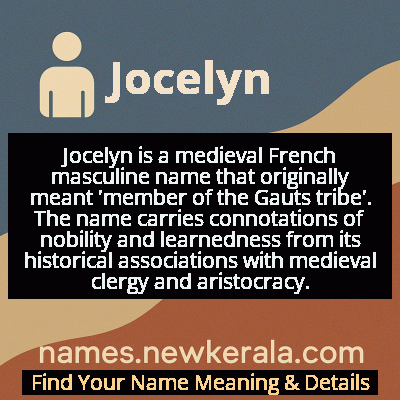Jocelyn Name Meaning & Details
Origin, Popularity, Numerology Analysis & Name Meaning of Jocelyn
Discover the origin, meaning, and cultural significance of the name JOCELYN. Delve into its historical roots and explore the lasting impact it has had on communities and traditions.
Name
Jocelyn
Gender
Male
Origin
French
Lucky Number
3
Meaning of the Name - Jocelyn
Jocelyn is a medieval French masculine name that originally meant 'member of the Gauts tribe'. The name carries connotations of nobility and learnedness from its historical associations with medieval clergy and aristocracy.
Jocelyn - Complete Numerology Analysis
Your Numerology Number
Based on Pythagorean Numerology System
Ruling Planet
Jupiter
Positive Nature
Optimistic, inspirational, and creative.
Negative Traits
Scattered, exaggerating.
Lucky Colours
Yellow, gold, purple.
Lucky Days
Thursday.
Lucky Stones
Yellow sapphire.
Harmony Numbers
1, 2, 9.
Best Suited Professions
Arts, writing, communication.
What People Like About You
Creativity, optimism.
Famous People Named Jocelyn
Jocelyn of Furness
Monk and Hagiographer
Wrote influential saints' lives and was a significant religious figure in medieval England
Jocelyn I, Count of Edessa
Crusader Noble
Ruled the County of Edessa and played a key role in early Crusader politics
Jocelin of Glasgow
Bishop
Oversaw significant ecclesiastical reforms and building projects in medieval Scotland
Jocelyn de Brakelond
Chronicler
Wrote the Chronicle of the Abbey of St. Edmunds, providing valuable historical insight
Name Variations & International Equivalents
Click on blue names to explore their detailed meanings. Gray names with will be available soon.
Cultural & Historical Significance
The name's cultural significance lies in its strong association with medieval French aristocracy, religious scholarship, and crusader history. Figures like Jocelyn of Furness and Jocelyn de Brakelond contributed to the name's reputation for learnedness and religious devotion, while crusader counts like Jocelyn I of Edessa associated it with military leadership and political power. This dual heritage of scholarly and noble associations made Jocelyn a name that represented both intellectual and leadership qualities in medieval society. The name's decline in masculine usage and subsequent feminine adoption in modern times represents an interesting cultural shift in naming conventions while preserving its rich historical legacy.
Extended Personality Analysis
Men named Jocelyn are traditionally associated with a personality profile that blends intellectual depth with noble bearing. The name's medieval origins and association with clergy and chroniclers suggest qualities of wisdom, contemplation, and scholarly pursuit. Those bearing this name are often perceived as thoughtful individuals who value knowledge and reflection, capable of deep analysis and careful consideration before action. This intellectual dimension is balanced by the name's noble associations, which imply leadership capability, dignity, and a sense of responsibility.
Additionally, the crusader connections of historical Jocelyns contribute to personality traits of courage, determination, and principled action. There's an expectation of moral strength and the ability to defend one's beliefs when necessary. The combination of these elements creates a personality that is both reflective and decisive—someone who can contemplate complex matters while also possessing the fortitude to make difficult decisions. This balance makes the name suitable for individuals who are expected to demonstrate both intellectual and leadership qualities, embodying the medieval ideal of the learned noble or the scholarly leader.
Modern Usage & Popularity
In contemporary naming practices, Jocelyn as a masculine name has become increasingly rare, largely displaced by its feminine usage which gained widespread popularity throughout the 20th century. However, it maintains a distinctive presence among families seeking historical or unique masculine names with medieval French heritage. The name occasionally appears in academic, aristocratic, or historically-minded families where traditional naming conventions are valued. Current usage trends show it as an uncommon but meaningful choice for boys, often selected by parents with interests in medieval history, French culture, or those seeking to honor specific family traditions. Its rarity in modern masculine usage gives it a distinctive quality that appeals to parents looking for names that are both historically significant and uncommon in contemporary society. The name's transition from exclusively masculine to predominantly feminine represents one of the more interesting gender shifts in naming history while preserving its medieval origins for those who choose to maintain its traditional masculine usage.
Symbolic & Spiritual Meanings
Symbolically, Jocelyn represents a profound connection to medieval heritage and the evolution of cultural identity across centuries. The name embodies the symbolic qualities of historical continuity, serving as a living link to medieval French and Norman culture. Its associations with clergy and chroniclers lend it symbolic weight as a representation of knowledge preservation, wisdom, and spiritual depth. The crusader connections add layers of symbolism related to courage, principled action, and the defense of beliefs. The name's journey from exclusively masculine to predominantly feminine usage in modern times symbolizes cultural adaptability and the fluid nature of gender associations in naming practices. As a name that has maintained its core identity while adapting to changing social norms, Jocelyn symbolizes both tradition and transformation—honoring historical roots while embracing contemporary evolution. This makes it a name rich with symbolic meaning for those who appreciate both historical depth and modern relevance.

